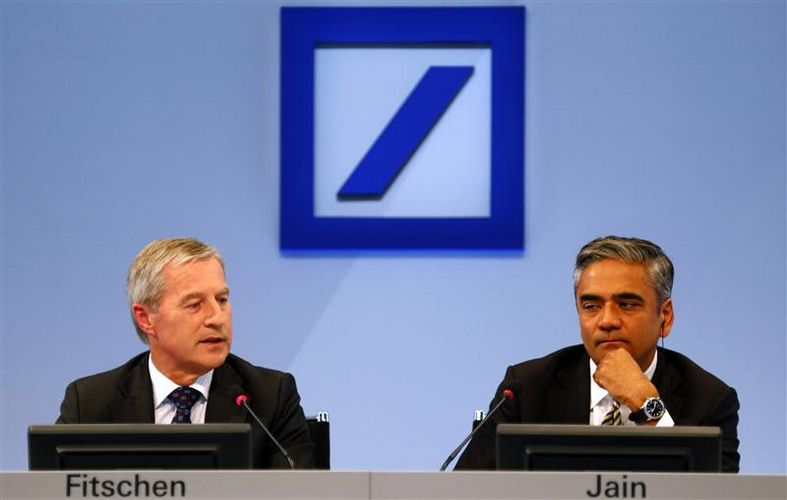Cue Queen’s 1980 #1 hit “Another One Bites the Dust”, or should that be “Another Two…”
In the aftermath of the Deutsche Bank’s involvement in what have become the usual suspects in terms of reputation sapping scandals, it was clear that one of the two co-CEOs would have to go, but I had suspected that Juergen Fitschen would become the sacrificial pawn in this game of management chess.
That Anshu Jain would leave the bank just when we were all beginning to buy into the story that it would ditch its aspirations to be a full-service institution and that it would focus on becoming what had been termed as the “European Goldman Sachs” could hardly have been predicted.
I’m sure the press will be full of staircase wit by all those who had known all along that neither man could survive but I, for one, am really taken aback to see them tender their resignations together.
Does this place in question Deutsche’s aspiration to become Europe’s foremost investment bank and the continent’s last chance to offer up any meaningful resistance to the moguls of Wall Street?
In truth, no. Not because it did not attempt to take on the Yanks but because, in my humble opinion, it never really stood a chance. The Americans have US$17 trillion domestic back yard which they can draw on before they go out to conquer the rest of the world. Eurozone here or there, it is not Deutsche’s domestic back yard and thus, irrespective, it will always be shooting out of the second row.
That does not detract from it probably still being Europe’s best overall investment bank but it has always had to pedal twice as hard to keep up with the US peer group and that, now, has taken its toll. The appointment of John Cryan, Cambridge man and ex-UBS banker, to replace Jain and to become sole CEO when Fitschen leaves his post in May 2016, points to a smaller but more focused investment bank.
The decision not to wheel out the current Chairman of the Supervisory Board, Paul Achleitner, the Austrian born ex-Goldman Mr. Fix-It of German finance, and to bring him back, as many had expected, into an executive role clearly marks the passing of that last, tainted generation of super-star bankers.
Snigger if you like; Deutsche will surely remain the gold-standard for European investment banking for many years to come. Shareholders should like that.
Iceland comes out of the cave
Like a set of tipping scales, as the extreme South-East dips, the extreme North-West rises. The first victim of the GFC, Iceland, emerges today from its period of sack-cloth and ashes as currency controls are lifted just as the situation in Greece has taken another turn for the worse. How many more ever-decreasing turns for the worse can there be left before that benighted country disappears up its own proverbial?
Maybe Iceland’s great advantage was that it was not part of the European Union, that it could quietly withdraw into the sovereign equivalent of a man-cave, lick its wounds, regroup and re-emerge in its own time as a right-sized entity. The pain suffered by its people has been extraordinary but with Nordic stoicism the crisis was faced up to and dealt with. None of the shrill nonsense and demagoguery we got from some of the Greek leaders and, most of all, no blaming everybody else for the problems which the country suffered.
Iceland and its banks were overtaken by hubris, got it wrong and the people paid the price. Greece denies the first, denies the second an expects other people to pay up. Based on some of the utterances which came out of Athens this week-end, we must assume that a peaceable resolution of the crisis is now further away than it was on Friday.
Open swim
Finally, Friday was taken up by the US Payroll numbers. With the headline Nonfarm number at 280,000, well ahead of the consensus of 226,000, all markets weakened as the chances of a Fed move to the tightening side of things promptly increased.
After Christine Lagarde’s mildly unguarded comments on US interest rate policy on Thursday, markets had briefly relaxed, but at 280k, May job creation was above both the 6 month and the 12 month moving average which brings a September tightening into closer focus.
There is still no time to relax. The reach for yield and the desire to invest away from the proximity to government rates will persist – just look at last week’s stampede for the brain-taxing Petrobras 100 year – while nervousness close to the curve will increase. This week will probably be another one of those “everybody into the pool, everybody out of the pool” kind of weeks.

